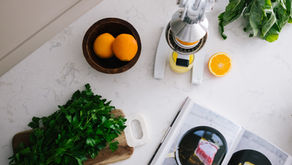The most important surface in your kitchen
A good work surface is critical in a well-functioning kitchen. When keeping a holistic perspective in mind, a good counter surface should be non-porous, stain & scratch resistant, non-toxic, locally produced, and beautiful. There are many great countertop material options available, but none of them will meet all of these criteria, so you need to find a balance of the pros and cons.

At one point, granite counters were a standard in most new kitchens, and though these natural stone slabs are beautiful, durable, and mostly toxin-free, they are not the most eco-friendly choice, or even best in performance. Granite, and other natural stone, is naturally porous and can become a breeding ground for bacteria, and requires regular maintenance in sealing it, typically with toxic sealers. There can be a lot of waste and environmental impact in quarrying granite and other natural stones, and significant transportation costs when sourced from places of far distance. Also, due to high demand and competition, granite is often sourced from places like India or Brazil where it is cheaper to dig, and the workers who extract it are mistreated and exploited.
More recently, granite and other natural stones have given way to engineered stone countertops, most commonly quartz counters. Quartz counters are made up of crushed stone (marble, quartz, granite, and sometimes glass or porcelain) held together with a resin binder through intense heat. It performs better than natural stone (being non-porous and extremely hard) and has a bit less impact on the environment, since it is often made with a lot of scrap material. But the process of fabricating this material can be harmful to the workers, due to the high content of silica (up to 93%). Breathing in the dust created by cutting quartz slabs carries the risk of developing deadly lung diseases, like silicosis. And the resin binders are a petro-chemical product.
Though granite and quartz are not as toxic as primarily plastic-based counters, like laminate and solid surface, there are other high-performance material options that have emerged that have more sustainable qualities, being made from renewal resources or having significant recycled content. One of the newest being sintered stone, an innovative material made of 100% crushed stone baked at extremely high heat without the need for any petrochemical resins or binders. It leads in performance, heat-resistance and durability, plus has more sustainable features. Other lesser-known and unique options for countertops that are great sustainable choices include recycled glass, recycled paper, recycled solid surface.

COUNTERTOPS
Healthy & Sustainable Countertop Options
QUARTZ

An engineered stone surface made up of about 90% ground quartz or other stone or minerals bound together with resin, polymers and pigments. They are durable non-porous, making for a high-performing surface, and they are available in a wide range of colours and textures
Manufacurers:
Pros:
-
Very Durable
-
Stain-resistant
-
Non-porous
-
Maintenance free
-
Wide colour range
-
Lower impact on environment than natural stone
-
Look for manufacturer's that use recycled content and responsible manufacturing procedures
Cons:
-
Contains silica - risk of lung disease for workers
-
Possibly high transportation costs
-
Cold to touch
SINTERED STONE

An engineered stone product made of 100% raw minerals baked in extremely high heat until the mineral fuse together in a solid slab. Each manufacturer uses their own propriety mix of crush stone and mineral ingredients.
Manufacurers:
Pros:
-
Heat Resistant
-
Very Durable
-
Stain-resistant
-
Non-porous
-
Maintenance free
-
Wide colour range
-
Silica-free
-
Lower impact on environment than natural stone
Cons:
-
Expensive
-
Possibly high transportation costs
-
Cold to touch
RECYCLED GLASS

An engineered product made of crushed recycled glass in a cement or resin binder. Each slab is unique, and is truly a piece of art as your counter. They are heat resistant and durable but come with a steep price tag
Manufacturers:
Pros:
-
Strong and durable
-
Heat resistant
-
Wide range of colours and finishes
-
Unique aesthetic
-
Up to 80% recycled material
Cons:
-
Not completely non-porous, requires sealing
-
Expensive
-
Possibly high transportation costs
-
Cold to touch
RECYCLED PAPER

It sounds unbelievable, but you can have beautiful countertops made from 100% post-consumer recycled paper! The paper is combined with non-petroleum and formaldehyde-free resins and pressed into sheets ¼” – 3” thick.
Manufacturers:
Pros:
-
All natural ingredients are non-toxic, abundant and biodegradable
-
Warm to touch
-
High recycled content
-
Wide range of colours and finishes
-
Easy to work with, no special tools required
-
Repairable
-
Lower cost than other options
Cons:
-
More prone to scratching
-
Not as heat resistant as other materials
-
Not suitable for extremely wet areas
RECYCLED SOLID SURFACE

A solid surface slab made of recycled plastics available is a wide range of vibrant colours, with the possiblity of custom colour matches. It creates a seamless, non-porous surface, perfect for sterile environments, and is completely repairable and recycleable.
Manufacturers:
Pros:
-
High recycled content
-
Seamless
-
Non-porous
-
Repairable
-
Wide range of colours, custom colours possible
-
Integrated sinks available
-
Warm to touch
Cons:
-
More prone to scratching
-
Not available in stone-type look
OTHER RECYCLED MATERIAL OPTIONS

There are some innovative materials that have emerged as countertop materials using high amounts of recycled content. They are mostly fabricated of some sort of recycled fiber in resin binder, and can offer a beautiful and unique aethetic.
Manufacturers:
Pros:
-
Wide range of colours and finishes
-
Unique Aesthetic
-
High recycled content
Cons:
-
More prone to scratching
-
May not be widely available
-
May be difficult to find fabricator to work with a new product




